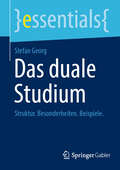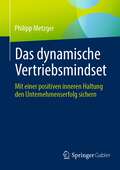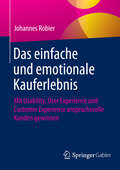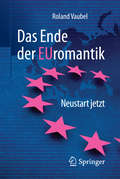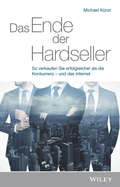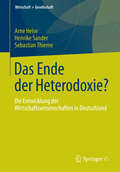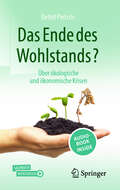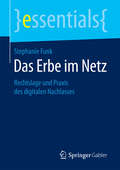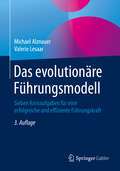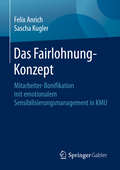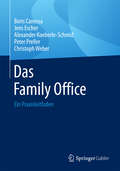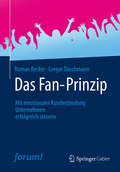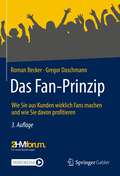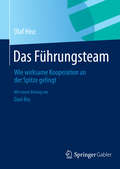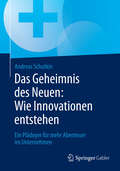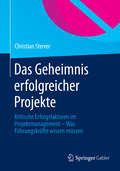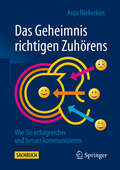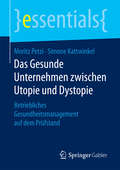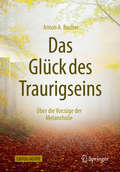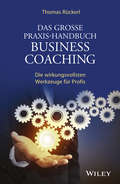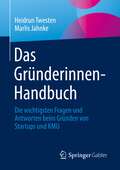- Table View
- List View
Das duale Studium: Struktur. Besonderheiten. Beispiele. (essentials)
by Stefan GeorgWer sein Fachabitur oder Abitur in der Tasche hat, stellt sich die Frage, wie es nach der Schule weitergehen kann. Ist ein Studium zu theoretisch? Inzwischen nutzen mehr als 120.000 Studierende in Deutschland die Form des dualen Studiums. Dieses verbindet die theoretische Hochschulausbildung mit unternehmerischer Praxis. Dieses Buch erklärt, wie ein Studium abläuft, zeigt die Merkmale und Strukturen dualer Studiengänge und stellt dar, wie Hochschulen duale Studienkonzepte umsetzen.
Das dynamische Vertriebsmindset: Mit einer positiven inneren Haltung den Unternehmenserfolg sichern
by Philipp MetzgerDieses Buch erläutert, warum die innere Haltung von Mitarbeitenden ein entscheidender Erfolgsfaktor ist und wie Vertriebsorganisationen diese gezielt fördern können. Konkret geht es um das dynamische Mindset, welches wesentlich zum Erfolg beiträgt, vor allem in Change-Phasen, die etwa im Rahmen von Digitalisierungsbestrebungen in Unternehmen stattfinden. Individuelle Emotionen und Motivationen, Prozesse und Kennzahlen müssen dann zusammengeführt werden.Der Autor zeigt die psychologischen Hintergründe zur Macht von Gedanken auf, und erklärt, wie ein dynamisches Mindset bei Menschen entsteht, welche unterschiedlichen Ausprägungen es gibt und welche Möglichkeiten zu einer positiven Veränderung bestehen. Er erläutert, wie ein Mindset zu jedem Zeitpunkt im Leben durch aktives Steuern beeinflusst werden kann und wie Vertriebsmitarbeiter und Führungskräfte hierbei gezielt vorgehen können – um Strahlkraft ins gesamte Unternehmen zu gewinnen und dieses nachhaltig erfolgreicher zu machen.
Das einfache und emotionale Kauferlebnis: Mit Usability, User Experience und Customer Experience anspruchsvolle Kunden gewinnen
by Johannes RobierBei der Entscheidung eines Kunden für den Kauf eines Produktes oder Dienstleistung sind viele Faktoren wichtig, die bewusst oder unbewusst wahrgenommen werden. Ausschlaggebend für Kaufentscheidung ist letztlich jedoch ein Gefühl des Vertrauens, das der Kunde entwickelt hat. Dieser "Reason to believe" ist der entscheidende Faktor, warum Produkte gekauft, weshalb Dienstleistungen in Anspruch genommen und wieso Kunden zu loyalen Stammkunden werden. Dieses Buch zeigt Ihnen von den psychologischen Grundlagen der Informationsvermittlung bis hin zu methodischen Anwendungen, wie Sie den ,,Reason to Believe" Ihrer Produkte und Dienstleitungen strukturiert erarbeiten, kommunizieren und in den Vordergrund stellen können.
Das Ende der Euromantik: Neustart jetzt
by Roland VaubelDieses Buch liest sich #65533;ber weite Strecken wie ein Enth#65533;llungsroman. Enth#65533;llt werden kaum bekannte Fakten zur Krise der Europ#65533;ischen Union. Der Untersuchung liegen umfangreiche Recherchen zugrunde. Roland Vaubel versucht zu erkl#65533;ren, weshalb die "Euromantik" einer weit verbreiteten Ern#65533;chterung gewichen ist. Er kritisiert die Politik der Europ#65533;ischen Zentralbank, den Marsch in die Haftungsunion, die Verletzung des Rechts und die Zuwanderungspolitik. Er zeigt anhand von Umfragen, dass die europapolitischen Akteure andere Zielvorstellungen als die B#65533;rger haben, und fordert eine st#65533;rkere demokratische Kontrolle. Die Kritik m#65533;ndet in konkrete Vorschl#65533;ge, wie Europa wieder ein Erfolgsmodell werden kann.
Das Ende der Hardseller: So verkaufen Sie erfolgreicher als die Konkurrenz - und das Internet
by Michael KunzlDie gute Nachricht ist: Gekauft wird immer, und aktuell mehr denn je. Die Verbraucher seien "in Konsumlaune" meldeten Zeitungen landauf, landab im Juli 2017. Verkäufer haben allerdings nur dann etwas davon, wenn Sie im persönlichen Gespräch deutlich mehr bieten als der Durchschnitt. Auch das ist eine gute Nachricht, denn wer es versteht, Kunden durch Aufmerksamkeit, Höflichkeit und exzellente Beratung zu überzeugen, wird künftig die Nase vorn haben. Persönlicher Verkauf wird vorwiegend da stattfinden, wo er dem Kunden einen persönlichen Mehrwert bietet. Gute Beratung ist dabei das Pflichtprogramm. Die Kür besteht darin, Sympathie, ein gutes Gefühl, ein echtes Verkaufserlebnis zu erzeugen. Und dafür braucht es den Sales Gentleman, der natürlich auch eine Sales Lady sein kann. Das Nachsehen hat der Hardseller. Das gilt auch für die weichgespülte "neue" Variante, die sich das Deckmäntelchen des Kundenverstehers umhängt, dabei den Umsatz aber weiterhin fester im Blick hat als sein Gegenüber. Wer zielstrebig durch den Verkaufsprozess pflügt, sonst aber nicht viel zu bieten hat, wird Kunden verlieren. Wer unhöflich, unaufmerksam, offensiv auftritt, erst recht. Denn je mehr Alternativen ein Kunde hat, je transparenter der Markt ist, je austauschbarer das Angebot, desto eher wird dieser Kunde sich anderswo umsehen. Gleichzeitig sind immer mehr Kunden bereit, etwas mehr Geld auszugeben, wenn die persönliche Ebene stimmt. Wer diese anspruchsvollen und oft auch sehr zahlungskräftigen Kunden überzeugt, muss sich um seine Zukunft als Verkäufer keine Sorgen machen. Worauf es dabei ankommt, lesen Sie in dem Buch von Michael Künzl.
Das Ende der Heterodoxie?: Die Entwicklung der Wirtschaftswissenschaften in Deutschland (Wirtschaft + Gesellschaft)
by Arne Heise Henrike Sander Sebastian ThiemeIn dem vorliegenden Buch wird die Entwicklung nach der Reformphase deutscher Universit#65533;ten in den 1960er und 1970er Jahren, die im Zuge der Studentenbewegung eine Pluralisierung der #65533;konomik ansto#65533;en wollte, aufgearbeitet und die Gr#65533;nde f#65533;r die Marginalisierung alternativer #65533;konomischer Theorien offengelegt.
Das Ende der unvereinbaren Gegensätze
by Stefanie Kuhnhen Markus von der LüheDas Buch macht Lust und zeigt, wie es geht: offener zu denken, zu arbeiten und zu leben – und sich dafür täglich neu zu entscheiden. Die Autoren zeigen konkret, wie sich vermeintliche Spannungsfelder konstruktiv überwinden lassen und sich daraus mitunter verblüffende und neue Chancen ergeben. Wie dieses neue Leben aussehen wird und was ein jeder persönlich tun kann, um sich weiterzuentwickeln, erklärt dieses Buch mit profundem Wissen und konkreten Handlungsanweisungen für Unternehmen, Institutionen und Privatpersonen.Fühlen Sie sich manchmal auch in der Zwickmühle? Dann sind Sie vielleicht in einem unvereinbaren Gegensatz gefangen. Aber muss das wirklich sein? Die Autoren sagen nein und zeigen, wie man Gegensätze auflösen und daraus neue Chancen entwickeln kann.„Das Ende der unvereinbaren Gegensätze“ blickt mit einem anderen Perspektive auf die Digitale Transformation und macht sie nicht für alles zum Sündenbock. Die Digitalisierung ist zwar der Auslöser für die aktuellen Veränderungen, sie ist jedoch nicht der alleinige Erfolgsfaktor für ein besseres Leben. Durch die Digitalisierung wird vielmehr eine evolutionäre Entwicklung erlebbar: Dinge „vermenschlichen“ sich und Menschen „verdinglichen”. Menschen holen das Beste aus sich heraus, indem sie sich für Technologien in allen Lebensbereichen öffnen. Der Gegensatz Mensch-Maschine löst sich auf. Dies im persönlichen Alltag zu erleben, ermöglicht uns, weitere scheinbare Gegensätze wie z.B. Arbeitsleben und Privatleben, Emotion und Ratio, Ökonomie und Ökologie – längst überfällig – zu überwinden.Das Denken in Gegensatzpaaren hat Orientierung gegeben. Als Teil unserer Ausbildung und Sozialisierung prägte es u.a. die Organisationsstrukturen unserer Unternehmen. Schon im Begriff „Ab-Teilung“ manifestiert sich die Auffassung, dass z.B. die Bereiche Marketing und IT oder Produktentwicklung und After-Sales-Service voneinander abgetrennt sein sollten. Heute spüren wir indes immer deutlicher, dass getrennte Welten nicht mehr erfolgreich sein werden. So führt uns die Digitalisierung auch auf einen nächsten Level der Entwicklung, der entscheidende Auswirkungen sowohl auf Organisationentwicklung, Business-Modelle aber auch unsere persönliche Entwicklung und Verhalten haben wird.
Das Ende des Wohlstands?: Über ökologische und ökonomische Krisen
by Detlef PietschDer Wohlstand auf der Welt war schon immer ungleich verteilt: Während vor allem die reichen Industrieländer in der Vergangenheit überproportional von der Globalisierung profitierten, leben auch heute noch Millionen von Menschen im globalen Süden zum Teil in bitterster Armut. War das schon schlimm genug, sorgt heute der menschengemachte Klimawandel u. a. für lange Dürreperioden, Ernteausfälle oder Hochwasser mit fatalen Folgen für die Bevölkerung. Seit Beginn des Ukrainekrieges und mit der daraus resultierenden Energiekrise sind jetzt auch die vermeintlich reicheren Länder dieser Erde mehrheitlich in ihrem Wohlstand bedroht. Das gilt auch für Deutschland. Die Gas- und Strompreiskrise trifft vor allem die energieintensiven kleinen und mittelständischen Unternehmen, das Rückgrat der deutschen Wirtschaft. Zudem kämpft das untere Einkommens- und Vermögensdrittel in Deutschland um das wirtschaftliche Überleben angesichts der hohen Inflation und der drohenden Rezession. Es scheint, als ob sich die Ungleichheit der Einkommen und Vermögen weiter verschärft und die Gesellschaft spaltet. Am Ende bleibt, so scheint es, nur noch eine hauchdünne Oberschicht in den reichsten Ländern der Welt übrig, die ihren Wohlstand genießen kann. Kann diese Entwicklung das Ziel der Ökonomie sein? Was können wir gemeinsam dagegen tun, um diesen Trend aufzuhalten? Dieses Buch hilft, Antworten zu finden. Denn gelingt uns das nicht, droht ansonsten das Ende des Wohlstands für (fast) alle.
Das Ende des Wohlstands?: Über ökologische und ökonomische Krisen
by Detlef PietschDer Wohlstand auf der Welt war schon immer ungleich verteilt: Während vor allem die reichen Industrieländer in der Vergangenheit überproportional von der Globalisierung profitierten, leben auch heute noch Millionen von Menschen im globalen Süden zum Teil in bitterster Armut. War das schon schlimm genug, sorgt heute der menschengemachte Klimawandel u. a. für lange Dürreperioden, Ernteausfälle oder Hochwasser mit fatalen Folgen für die Bevölkerung. Seit Beginn des Ukrainekrieges und mit der daraus resultierenden Energiekrise sind jetzt auch die vermeintlich reicheren Länder dieser Erde mehrheitlich in ihrem Wohlstand bedroht. Das gilt auch für Deutschland. Die Gas- und Strompreiskrise trifft vor allem die energieintensiven kleinen und mittelständischen Unternehmen, das Rückgrat der deutschen Wirtschaft. Zudem kämpft das untere Einkommens- und Vermögensdrittel in Deutschland um das wirtschaftliche Überleben angesichts der hohen Inflation und der drohenden Rezession. Es scheint, als ob sich die Ungleichheit der Einkommen und Vermögen weiter verschärft und die Gesellschaft spaltet. Am Ende bleibt, so scheint es, nur noch eine hauchdünne Oberschicht in den reichsten Ländern der Welt übrig, die ihren Wohlstand genießen kann. Kann diese Entwicklung das Ziel der Ökonomie sein? Was können wir gemeinsam dagegen tun, um diesen Trend aufzuhalten? Dieses Buch hilft, Antworten zu finden. Denn gelingt uns das nicht, droht ansonsten das Ende des Wohlstands für (fast) alle. Das Besondere an dieser Ausgabe: Sie wurde um ein Hörbuch erweitert. Die mittels künstlicher Intelligenz generierten Audiodateien sind online verfügbar und können über die Kurz-URL mit der MoreMedia-App von Springer Nature abgerufen werden.
Das Erbe im Netz: Rechtslage und Praxis des digitalen Nachlasses (essentials)
by Stephanie FunkDieses essential ordnet den digitalen Nachlass in den rechtlichen Gesamtkontext ein, beantwortet die vielschichtigen juristischen Fragestellungen, die das ,,Erbe im Netz" mit sich bringt, und beleuchtet die ersten Rechtsprechungsans#65533;tze zu diesem Thema. Stephanie Funk zeigt, welche M#65533;glichkeiten f#65533;r den k#65533;nftigen Erblasser zu Lebzeiten bestehen, sein digitales Erbe nach eigenen W#65533;nschen zu lenken, vor allem durch ein Testament. Auch die Regelungsm#65533;glichkeiten im Rahmen von Vorsorgevollmachten f#65533;r den Fall der lebzeitigen Gesch#65533;ftsunf#65533;higkeit werden in diesem Zusammenhang vorgestellt. Der Leser erf#65533;hrt, welche Optionen es f#65533;r Erblasser und Erben gibt, um mit den Daten und Spuren umzugehen, die wir alle im Internet hinterlassen - seien es Passw#65533;rter, E-Mails, Blogbeitr#65533;ge, Fotos, Videos oder Dokumente. Das Hauptaugenmerk liegt dabei auf der E-Mail-Korrespondenz als Kernst#65533;ck der Internett#65533;tigkeit.
Das evolutionäre Führungsmodell: Sieben Kernaufgaben für eine erfolgreiche und effiziente Führungskraft
by Michael Alznauer Valerie LesaarDas Chefsein beenden! So lautet eine der radikalsten Auswüchse der Diskussion in der „Welt der Führung“. Provokante Thesen haben Konjunktur: New Leadership, Agiles Führen, Künstliche Intelligenz, das Ende der Hierarchie… Es ist schwer, in diesem widersprüchlichen Durcheinander nicht die Orientierung zu verlieren.Mit einem einzigartigen Führungsmodell, das die Evolution des Menschen in den Mittelpunkt stellt, schaffen die Autoren Klarheit. Sie nehmen uns mit auf eine spannende Zeitreise, identifizieren die Erfolgsbausteine der Führung und leiten konkrete Empfehlungen für die Führungspraxis ab.Die 3. Auflage wurde vollständig überarbeitet und ergänzt.
Das Fairlohnung-Konzept: Mitarbeiter-Bonifikation mit emotionalem Sensibilisierungsmanagement in KMU
by Sascha Kugler Felix AnrichDieses Buch stellt kleinen und mittelständischen Unternehmen die Frage: Sind Sie als Arbeitgeber attraktiv für den Arbeitnehmermarkt, ziehen Sie qualifizierte Arbeitskräfte an und ist dies im Innen- und Außenauftritt spürbar? Haben Sie hierfür ein Benefit-Konzept aufgebaut, das kommuniziert, sensibilisiert, kontrolliert wird und dadurch Mitarbeiter emotional bindet?Aktuelle personalpolitische Herausforderungen wie die Fluktuation, die demografische Entwicklung, der Fachkräftemangel oder auch die steigenden Krankheitsquoten in den Unternehmen führen zu deutlich erhöhten Personalkosten. So lautet die These der Autoren: im aktuellen Zeitalter der Digitalisierung sollte der „Fokus Mensch“ nicht aus den Augen verloren werden, um langfristig am Markt bestehen zu bleiben. Ohne besondere Mitarbeiter-Bonifikation sind Arbeitgeber einfacher austauschbar.Das Buch zeigt verschiedene Möglichkeiten auf, neben dem Barlohn Ihre Arbeitgebermarke durch besondere Zusatzleistungen und Bonifikationen attraktiv zu gestalten. Der Schwerpunkt liegt darin, ein Benefit-Management-System im Unternehmen so zu gestalten, dass möglichst alle Mitarbeiter erreicht werden, die Leistungen emotional wahrgenommen und nachhaltig abgerufen werden.
Das Family Office: Ein Praxisleitfaden
by Christoph Weber Alexander Koeberle-Schmid Boris Canessa Jens Escher Peter PrellerUnternehmer erhalten durch dieses Buch entscheidenden Rat in der Frage, welche Art von Family Office f#65533;r sie passt. Wichtige Fragen sind: Welche Leistungen kann das Family Office erbringen? Welche Rechtsform soll das Family Office haben und wie soll es strukturiert sein? Was kann es zum Familienmanagement beitragen? Wer darf wann welche Leistungen zu welchem Preis beziehen? Wer darf entscheiden und wann? Wer bekommt Informationen und zu welchem Zeitpunkt? Fundiert und praxiserprobt zeigen die Autoren die wichtigsten Aufgaben und Ausgestaltungsm#65533;glichkeiten auf. Auch Family Officer und Berater erhalten wertvolle Hinweise, erg#65533;nzt durch ausgew#65533;hlte Interviews mit Unternehmern und Spezialisten.
Das Fan-Prinzip: Mit emotionaler Kundenbindung Unternehmen erfolgreich steuern
by Roman Becker Gregor DaschmannWie Sie Ihre Kunden zu leidenschaftlichen Unternehmensfans machen, zeigen Roman Becker und Gregor Daschmann eindrucksvoll in diesem Buch. Denn im Gegensatz zu zufriedenen Kunden sind Fan-Kunden emotional an Ihr Unternehmen gebunden und tragen maßgeblich zum nachhaltigen wirtschaftlichen Erfolg bei - sowohl als direkte Käufer als auch als aktive Botschafter. Die Autoren erläutern, warum ein komplettes Umdenken im Kundenbeziehungsmanagement und eine Abkehr von den gewohnten Steuerungsgrößen erforderlich sind und warum Kundenzufriedenheit alleine nicht mehr ausreicht. Basierend auf Interviews mit mehr als 100. 000 Kunden vermitteln sie direkt nachvollziehbar, was Fan-Kunden ausmacht, warum sie so viel wert sind, wie man emotionale Kundenbindung messen kann - und vor allem: wie man sie steuert und steigert! Ein Muss für alle Wirtschaftsentscheider, die ihr Unternehmen noch erfolgreicher machen wollen. Mit Website zum Buch.
Das Fan-Prinzip: Wie Sie aus Kunden wirklich Fans machen und wie Sie davon profitieren
by Roman Becker Gregor DaschmannJedes Unternehmen will seine Kunden zu echten und lebenslangen Fans machen. Wie das (wirklich) funktioniert, zeigen die Entdecker des Fan-Prinzips, Roman Becker und Gregor Daschmann, in diesem Buch. Dazu übertragen sie die Mechanismen von Fan-Beziehungen aus dem Sport, der Musik und der Kunst auf Unternehmen und Kunden. Was macht Fan-Kunden aus? Wie identifiziert man sie? Und wie lässt sich die Fan-Quote steuern und steigern? Auf all diese Fragen liefert dieses Buch Antworten. Basierend auf Erhebungen und Interviews mit mehr als 100.000 Befragten wird deutlich, dass Fans den höchsten Kundenwert haben und deshalb maßgeblich zum wirtschaftlichen Erfolg eines Unternehmens beitragen. Allerdings sind zur Gewinnung von Fan-Kunden ein komplettes Umdenken im Kundenbeziehungsmanagement und eine Abkehr von gewohnten Steuerungsgrößen erforderlich. Doch dieser Weg lohnt sich. Denn Fan-Kunden sind ihrem Anbieter emotional verbunden und bilden eine neue, verlässliche Währung – sowohl als direkte Käufer als auch als aktive Botschafter. Ein Muss für alle Wirtschaftsentscheider, die die Beziehungsqualität zu ihren Kunden steigern, dabei noch Geld sparen und mehr als nur kurzfristigen Erfolg erreichen wollen. Neu in der 3. Auflage: Konkrete Anregungen zur Implementierung des Fan-Prinzips, vertiefende Video-Podcasts sowie Interviews mit Top-Entscheidern. Auf der Webseite zum Buch erhalten Sie weitere Informationen.
Das Führungsteam: Wie wirksame Kooperation an der Spitze gelingt
by Olaf HinzEinsame Helden in den Chefetagen - das ist weder zeitgemäß noch erfolgversprechend, denn die Themen sind zu vielfältig, die Fragestellungen zu komplex und die zu treffenden Entscheidungen zu zahlreich. Führungsteams sind auf dem Vormarsch - und sie sind nicht nur erfolgreicher, sondern auch gelassener und zufriedener. Wie aber können Manager ein wirksames Team bilden und ihre Unterschiede bewusst nutzen, ohne ihren individuellen Erfolg zu vernachlässigen? Olaf Hinz gibt Denkanstöße, konkrete Anregungen und liefert einen praxiserprobten Prozess, wie ein wirksames Führungsteam entsteht. Er zeigt die notwendige Haltung und behandelt auch die Themen Macht, Einfluss, Unternehmenspolitik und Eitelkeiten.
Das Geheimnis des Neuen: Ein Plädoyer für mehr Abenteuer im Unternehmen
by Andreas SchutkinDas Buch zeigt, wie das Neue Routinen und Widerstände in Unternehmen überwinden kann. Innovationen entstehen oft zufällig und meist sind solche Unternehmen am erfolgreichsten, die einen Artenschutz für echte Erneuerer einführen und an den Mut und die Neugier ihrer Mitarbeiter plädieren. Es ist riskant. Es ist unbequem. Es stört. Das Neue ist in Unternehmen nicht gern gesehen. Wie Sie als Entscheider trotzdem die richtigen Weichen für Innovationen stellen - darum geht es in diesem leidenschaftlichen Plädoyer für das Neue. Sie erfahren, warum Abenteurer und Routiniers getrennt zu besseren Ergebnissen kommen, warum ein Chief New Officer so wertvoll ist und wie Sie das Plus-Modell für Innovationen zielsicher einsetzen. Mit Test: Sind Sie Routinier oder Abenteurer?
Das Geheimnis erfolgreicher Projekte: Kritische Erfolgsfaktoren im Projektmanagement – Was Führungskräfte wissen müssen
by Christian SterrerDie zunehmende Projektorientierung in Organisationen verlangt von Führungskräften immer häufiger ein gewisses Maß an Projektmanagement-Know-how. Dabei ist kein Expertenwissen sondern, die Fähigkeit gefragt, den Status von Projekten richtig einzuschätzen, über die Auswahl von Projekten zu entscheiden und die Ressourcen adäquat zu managen. Denn erst dann ist ein Unternehmen in der Lage Projekte professionell zu managen und Strategien umzusetzen. Dieses Buch schafft den Spagat zwischen thematischer Vollständigkeit und reduzierter inhaltlicher Komplexität und gibt Führungskräften einen Überblick über die wesentlichen Themen des Projektmanagements. Die kritischen Erfolgsfaktoren werden praxisorientiert erläutert und klare, handlungsorientierte Empfehlungen zeigen Führungskräften worauf es im Projektmanagement ankommt. Checklisten sowie die Möglichkeit des Downloads von sofort einsetzbaren Hilfsmitteln und Vorlagen machen das Buch zum Praxisbuch, das dem Leser nicht nur die Möglichkeit gibt, das Projektmanagement im eigenen Unternehmen zu analysieren, sondern ihn auch unterstützt, das Einzel-, Projektportfolio- und Ressourcenmanagement zu optimieren
Das Geheimnis richtigen Zuhörens: Wie Sie erfolgreicher und besser kommunizieren
by Anja NiekerkenBesser kommunizieren! Wer wünscht sich das nicht? Endlich verstanden zu werden, ohne Reibungsverluste. Das wäre toll. Wir sind so sehr darauf fixiert endlich verstanden zu werden, dass wir vollkommen vergessen, dass zu guter Kommunikation immer zwei gehören: Einer der verstanden wird und vor allem einer, der versteht! Warum aberverstehen wir einander immer weniger? Weil wir nie wirklich gelernt haben zuzuhören! Richtig Zuhören heißt, sich ganz auf das Gegenüber zu konzentrieren, ohne dabei den eigenen Gedanken nachzuhängen und ohne schon wieder auf unseren nächsten Einsatz als Redner zu warten.In diesem Buch geht es um die oft vernachlässigte Basis jeglicher Kommunikation und jeglichen Lernens: das Zuhören. Das wir mehr und besser Zuhören sollten, ist im Prinzip ein No-Brainer. Aber warum wir es tatsächlich nicht tun, warum aktives Zuhören häufig kontraproduktiv ist und wie wir wieder ins Zuhören kommen, stellt die Autorin Anja Niekerken aus alltäglicher Sicht und leicht verständlich vor.
Das Gelingen von Anpassungsprozessen an den Klimawandel: Instrumente, Strategien und mediative Methoden der Prozessbegleitung im öffentlichen Bereich
by Christa Fischer-KorpDieses Buch gibt Hilfestellungen für Gemeinden, um die mit dem Klimawandel verbundenen Herausforderungen zu meistern und dabei alle Interessensgruppen zu beteiligen. Fast alle Gemeinden stehen vor der Frage, wie die Anpassung an den Klimawandel für die Bürger vonstattengehen soll. Jede Gruppe, jede Institution, jeder Betrieb wird Bedürfnisse artikulieren und die eigenen Interessen verteidigen. Das Buch zeigt auf, wie in den Kommunen Konfliktfähigkeit hergestellt werden kann, wie die Herausforderungen für Gemeinden und Regionen analysiert und maßgeschneiderte Strategien für den Anpassungsprozess entwickelt werden können. Der Anpassungsprozess an den Klimawandel muss so gestaltet werden, dass Bedürfnisse beachtet werden und Interessen nach Möglichkeit ausgeglichen sind. Es braucht Kooperationen, Innovationen und den Blick für Synergien, um diese Aufgabe zu bewältigen. Ein besonderer Schwerpunkt liegt hier auf der Begleitung und Unterstützung durch Mediatoren. Die Autorin gibt den Verantwortlichen zahlreiche Praxisbeispiele, Analyse-Tools und Checklisten an die Hand. Damit wendet sich das Buch vor allem an Bürgermeister, Gemeindeverantwortliche, Klimabeauftragte, Anbieter von „grünen“ Projekten und an alle, die wollen, dass die Anpassung an den Klimawandel gelingt.
Das Gesunde Unternehmen zwischen Utopie und Dystopie: Betriebliches Gesundheitsmanagement auf dem Prüfstand (essentials)
by Moritz Petzi Simone KattwinkelDas vorliegende essential gibt einen umfassenden Einblick in die Themenfelder Gesundheit, Betriebliches Gesundheitsmanagement und Betriebliche Gesundheitsf#65533;rderung. Es erweitert den derzeitigen Diskurs #65533;ber Betriebliches Gesundheitsmanagement (BGM) in Wissenschaft und Praxis um eine kritische Perspektive. Das Autorenduo Simone Kattwinkel und Moritz Petzi stellt nicht nur die Frage nach der Verantwortung f#65533;r Gesundheit im Spannungsfeld von Individuum, Unternehmen und Staat, sondern dar#65533;ber hinaus nach der gesellschaftlichen Bedeutung von Mitarbeitergesundheit als organisationaler Gr#65533;#65533;e.
Das Gesundheitswesen und seine volkswirtschaftliche Bedeutung
by Maik Ebersoll Roman Grinblat Marianna Hanke-Ebersoll Thorsten JunkermannDie Beiträge in diesem Fachbuch stellen die volkswirtschaftliche Bedeutung des Gesundheitswesens für eine Gesellschaft aus unterschiedlichen Blickwinkeln dar. Dabei werden wirtschaftliche, sozialwissenschaftliche, medizinische und rechtliche Perspektiven eröffnet. Nach einem Überblick über die Komplexität und einer Einordnung der Vielfalt des Gesundheitswesens folgen Einblicke in die Sichtweisen der jeweiligen Stakeholder im Gesundheitssystem. Aber auch auf aktuelle methodische, prozessuale und technologische Fragestellungen und Herausforderungen wie z.B. digitale Gesundheitstechnologien wird, teils aus theoretischer und teils aus Praxissicht, eingegangen. Diese Interdisziplinarität ermöglicht es dem Leser, den eigenen Fokus zu erweitern und eine ganzheitlichere und zugleich diversifiziertere Sicht auf ein zentrales Funktionalsystem moderner Gesellschaften zu fördern. Neben der wenig überraschenden Bestätigung, dass das Gesundheitswesen eine signifikante wirtschaftliche Bedeutung für eine Volkswirtschaft hat, zeigen die Einzelbeiträge auch dessen Komplexität und Vielschichtigkeit sowie die Notwendigkeit immer wieder neu auszuhandelnder Kompromisse teils widerstreitender Interessen und Zielsetzungen.
Das Glück des Traurigseins: Über die Vorzüge der Melancholie
by Anton A. BucherIn diesem Buch über Glück und Melancholie können alle, die von dem Trend-Phänomen Glücksstreben ermüdet sind, erfahren, was zu einem wirklich guten Leben gehören könnte. In einer Zeit, zu der man den Eindruck bekommt, jeder Zweite sei von Burnout betroffen und jeder Vierte von einer Depression, lädt der Autor ein, die Vorzüge der Melancholie zu entdecken: Traurigkeit als Kompetenz, Widersprüche zu empfinden, und als komplexes, schöpferisches Gefühl, das ein Leben in emotionaler Vielfalt ermöglichen kann. Lernt man die Melancholie wertzuschätzen, kann sie einen ganz eigenen Weg ins Glück aufzeigen.Aus dem Inhalt: Streifzüge durch die Glücksgesellschaft – Glück als Pflicht? – Wenn sich positives Denken negativ auswirkt – Das Glück des Traurigseins – Empirische Daten zu Melancholie – Vorzüge der Melancholie.Über den Autor: Prof. Dr. Anton A. Bucher widmet sich neben seinen universitären Studien gern psychologischen Aspekten des guten Lebens und ist Autor mehrerer erfolgreicher Bücher.
Das Grosse Praxis-Handbuch Business Coaching: Die wirkungsvollsten Werkzeuge für Profis
by Thomas RückerlAls Business-Coach brauchen Sie wirksame Werkzeuge, mit denen Sie schnell, nachhaltig und erfolgreich arbeiten können. Das Buch von Thomas Rückerl präsentiert Ihnen einen psychologischen Werkzeugkoffer: Erleben Sie einen spannenden Blick hinter die Kulissen professioneller Coaching-Kompetenz. Anhand praktischer Beispiele wird der Einsatz der wichtigsten Coaching- Instrumente sowohl für Einsteiger als auch für fortgeschrittene Business- Coaches anschaulich dargestellt. Die einzelnen Werkzeuge sind alphabetisch sortiert, leicht lesbar und verständlich erklärt. Die motivierenden Gebrauchsanweisungen von Thomas Rückerl sprechen eine lebendige Sprache – aktuell, praxiserprobt und dynamisch. Ein unschlagbarer Werkzeugkoffer für Coaches – jederzeit einsatzbereit für die Praxis im Business-Coaching. Und ein ideales Nachschlagewerk für Profis, das zeigt, wie wirksames Coaching hinter den Kulissen funktioniert!
Das Gründerinnen-Handbuch: Die wichtigsten Fragen und Antworten beim Gründen von Startups und KMU
by Heidrun Twesten Marlis JahnkeDas Gründerinnen-Handbuch soll mehr Frauen motivieren, zu gründen – vom kleinen Unternehmen bis zum skalierbaren Startup mit Weltmarktambitionen. Die Autorinnen machen Mut, den Sprung in die Selbständigkeit zu wagen – auf Grundlage ihrer eigenen unternehmerischen Erfahrungen sowie des Know-how ihres Netzwerks: Dazu haben sie zahlreiche Startup-Gründerinnen, Investor:innen sowie Expert:innen interviewt und bieten einen fundierten und pragmatischen Einstieg – mit wertvollen Praxis-Tipps. Die vollständigen Interviews gibt’s auch in ihrem Podcast „EQUALIZER – von und für Gründerinnen“ auf den gängigen Plattformen wie Spotify und Apple Podcasts.Das Buch stellt die relevanten Phasen und Methoden beim Gründen vor und zeigt prägnant, was wichtig ist: Wie ist der Weg von der ersten Idee und der Frage nach dem „Why“ bis zum überzeugenden Businessplan? Welche Formen der Finanzierung gibt es und wie wähle ich Investor:innen aus? Wie lassen sie und Kunden sich von der Idee überzeugen? Neben den fachlichen Themen beleuchten die Autorinnen auch die menschliche Komponente: Wie funktioniert Networking wirklich gut? Wann im Leben ist Gründen sinnvoll und wie funktioniert es mit der Work-Life-Balance am besten? Was hilft Gründerinnen, sich in diesem noch sehr männlich dominierten Bereich erfolgreich zu bewegen? Viele inspirierende Best-Practice-Beispiele zeigen, dass Unternehmerin zu werden eine spannende Option für Frauen ist. Legt los!Mit wertvollen Tipps von 15 Gründerinnen: Alina Bassi, KleiderlySophie Chung, Qunomedical Dalia Das, neue fische GmbH, School and Pool for Digital TalentStefanie A. Engelhard, Unleash Future Boats Andrea Fernandez, VitaminDr. Joana Gil, LignoPure Daniela Greiffendorf, European Seniors' SchoolLaetitia Hörnler, mamis travelguideChristine Kiefer, RIDE Carolin Kunert, Knister Dr.-Ing. Anne Lamp, traceless materials Katharina Obladen, UVIS UV-Innovative Solutions Miriam Schütt, SofaConcerts Lena Weirauch, ai-omatic solutions Ines Woermann, helloguide und 12 Investor:innen und Expert:innenDr. Isabelle Canu, respinJudith Dada, La Famiglia Fridtjof Detzner, Planet A Tina Dreimann, better venturesAlexa Gorman, encourageventures e.V. & SAP.iOSina Gritzuhn, Hamburg StartupsDoreen Hotze, Handelskammer HamburgNico Lumma, NMA.VC Dr. Kirsten Mikkelsen, Jackstädt-ZentrumDr. Christian Nagel, EarlybirdSanja Stankovic, german.innovationBettine Schmitz, Auxxo, Evangelistas
